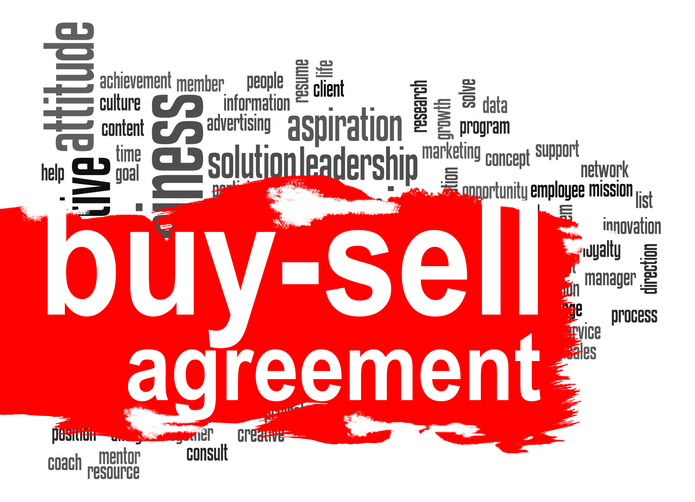
Buy-Sell Agreement Life Insurance
What Is A Buy-Sell Agreement?
A buy-sell agreement refers to a legally binding contract that specifies how a partner’s share of a business may be reassigned if that partner passes on or abandons the business. A buy-sell agreement is also known as a buyout agreement, business prenup or business will.
The buy-sell agreement states how the deceased owner’s shares should be sold to the remaining partners or the partnership company.
How A Buy and Sell Agreement Functions
Sole proprietorships closed corporations, and partnerships often use buy-sell agreements. The purpose of buy-sell agreements is to ensure that there is a smooth transition in the event of a partner’s death, exit, or retirement. If one business owner dies, the remaining owners must agree on selling their share of the business.
Types of Buy-Sell Agreements
The most common purchase and sales agreements include:
Cross-Purchase Plans
Under this type of plan, the owners agree with each other. Each owner purchases a life insurance policy on the other owner and will be named the beneficiary of the policy. Upon the death of an owner, each surviving owner receives life insurance proceeds income-tax-free. Therefore uses the proceeds to purchase the deceased’s business interests, while the heirs receive an agreed amount.
Entity Repurchase Plan/Redemption Agreement
Each employee-owner enters into an agreement with the business to sell their interest in the business. As part of the agreement, the business buys life insurance policies on the lives of each owner. The business pays the premiums and therefore exists as the owner and policy written on the partner’s life.
A Hybrid Version
Combines features from the cross-purchase agreement and redemption agreement. In the hybrid version, the partners can opt to buy the business for sale and the business entity takes the other one.
What Are The Key Elements In Buy-Sell Agreements?
Various elements or conditions trigger a buy-sell agreement. These include:
Valuation Method
In buy-sell agreements, there are various business valuation approaches. Some buy-sell agreements try to set the price annually and allow every partner to sign off on the agreed valuation. Other businesses use the book valuation or the valuation formula while others define a formula.
Funding Strategy
The funding strategy is one of the key determinant factors in a buy-sell agreement. Insurance is one of the most preferred ways of funding the agreement. The problem arose when a shareholder dies or retires and the buy-sell agreements are longer tenable.
In this case, the buy-sell agreements must offer specific terms of payment. At the same time, you should understand that the buy-sell agreements will offer the shareholder some extended terms of payment. If the shareholder retires abruptly before the retirement age, they will get a reduced value of their share.
Triggering Events
Triggering events play a critical role in pushing for a buy-sell agreement. The most common triggering events among business partnerships include:
Death
If the shareholder is dead, a good buy-sell agreement should come in handy to address the beneficiaries of the deceased. In most cases, people fear taking up the shareholder’s position in the company or they are too busy elsewhere that they do not want to get involved in the business operations.
Marital Breakdown
The best buy-sell agreement should consider the fact that an interest in any business could be subject to division of property regimes under the provincial matrimonial law. The provisions must be added to the buy-sell agreement to allow other shareholders to buy the business part of the shareholder whose portion will undergo division after a marital breakdown. In the same context, the buy-sell agreement should enlist that the other spouse can get awarded shares of the business as part of the divorce settlement.
Illness
Terminal illnesses, poor mental health, and Alzheimer’s are some of the illnesses that must be considered in a buy-sell agreement. If the shareholder is critically ill or disabled, most shareholders can exit the business and demand the value of the business interest. Besides, the disabled shareholder may find it difficult to contribute to the organization. They would opt out of the business and other interested shareholders and purchase the business.
Living Buy-Out
The living buy-out takes place when there is a dispute in the business or the shareholder wants to retire. In such situations, the terms of the transaction and the best approvals of other shareholders must be stated to enable a smooth transition.
Bankruptcy
If one of the shareholders experiences solvency, the other shareholders must have the power to take his assets and company shares. The buy-sell agreement also accords the remaining shareholders’ power to allow creditors to come in and auction the bankrupt shareholder’s share of the company.
Who Owns the Buy-Sell Agreement?
In a company, the business partners own the buy-sell agreement. All partners or shareholders of the business must append their signatures on the agreement to make it valid. Therefore, the buy-sell agreement is a contract among the business owners. It holds the owners accountable for the next course of action should one of the owners die. The remaining owners or the company buy the deceased’s shares and interest in the company in accordance with the predetermined terms in the contract. The buy and sell agreement nullifies a power vacuum should one of the owners die.

Purpose of Buy-Sell Agreements
A buy and sell agreement is drafted to meet specific interests of the business should certain events take place. You have put in capital, time skills, and other resources in building a business, it is in order that you must protect it. At times, unfortunate events such as the death and disability of one of the owners. The buy-sell agreement is like a contract that takes place of the unfortunate eventualities.
The following are the purposes of buy and sell agreements include:
- Offer a way of maintaining business continuity- Buy-sell agreements prevent a break-in managing and voting control of the business
- Directs compensation- The agreements guarantee that the survivor of a deceased owner is compensated for the deceased owner’s interest
- Protects the business and business owners- The buy-sell agreements create a market for the departing owner’s interest in the business when there is no market in the absence of an agreement
- Protect the business interest of owners- buy-sell agreements determine the business interest of all the owners.
- Lower dispute chances- the intent of buy-sell agreements is to take over the deceased owner’s share fast and prevent the deceased’s interest from being held in probate and avoid the probability of a personal representative.
- Mitigates ownership stress- buy-sell agreements are like contracts and they relieve ownership stress when one partner leaves the business.
What is the structure of buy-sell agreements?
The structure of the buy-sell agreements depends on the needs of the business owners. Usually, businesses use contract lawyers to design smart buy-sell agreements. These lawyers can work with all the business partners in drafting the agreement. Contract lawyers also play a critical role in the execution of the agreement. It is advisable that every partner must have counsel when they enter into the buy-sell contract. Also, a buy-sell agreement involves the family of the owners.
The Agreement Buy-Sell Agreement Must Have The Following:
- Valuation Methodology
- Well-defined triggering events
- Agreement’s financing terms
- Proper coordination of the property or shares and all transaction
- Inclusion of all the parties
Who Are The Beneficiaries Of Buy-Sell Agreements?
Business owners, the business, and the beneficiaries of the business owners are the beneficiaries of the buy-sell agreement.
How to Fund a Buy-Sell Agreement with a Life Insurance Policy?
Business specialists and financial planners advise that using life insurance to fund buy-sell agreements is the best option because they are well-funded. Plus, the proceeds are usually paid quickly after your death. And if sufficient cash values are available within the policies, the funds can be accessed to purchase your interest in the business if you retire or become disabled.
Some owners choose either to save money now and pay cash or to take out a loan to buy out a deceased owner’s share in the company. Both of these situations can be financially risky, both for the surviving owner(s) and the company itself. The smartest method for funding a buy-sell agreement is through life insurance. This ensures that funds are immediately available when a death occurs; plus, a death benefit.
Is the Buy-Sell Taxable or Non-Taxable?
Poorly structured buy-sell agreements can produce different outcomes. Contract lawyers must offer legal or tax advice when drafting all buy-sell agreements.
The use of life insurance policies in buy-sell agreements allows for instant cash/liquidity to be used in either continuing the business or preventing a fire sale, allowing proper time for a buyer to be found. Other advantages include: death benefits proceeds are generally income tax-free, funds are purchased for pennies on the dollar, and premiums are likely to be significantly lower than the loan interest.
What happens if I don’t have a buy-sell agreement with my business partner?
Businesses take time and many resources to build. A buy and sell agreement helps you to streamline things in the event of your death or exit. However, if you do not have one, your partner or any next of kin may take over your position in the company. The decision may not be easy because it may create several problems for the company and other partners. In that case, the lawyers must take over the issue. Other outcomes include selling the company or taking the business through disruption and maybe eventual dissolution.
How To Draft a Buy-Sell Agreement & What is Needed?
Consider the following before making a buy-sell agreement:
- The number of owners- If you are planning to take the redemption agreement, the business must buy life insurance policies for all the owners. In one owner leaves the company or dies, the death benefits are used to buy out the interest of the deceased owner.
- Transfer restrictions- You must consider all transfer restrictions such that a business partner cannot make a haphazard transfer or his share. There must be clear laws that define the transfer of shares.
- Formula to be used to value the business- a fair market value, the book value, or formula approach
- Type of buy-sell agreements.
- The agreement must be flexible
- Periodically check the financial rating of your insurance company. The policies funding your buy-sell agreement will do your family no good if the insurer becomes insolvent.
What happens if my business partner dies and I don’t have a buy-sell in place?
I would consider giving his share to the next of kin or his beneficiaries.
Life Insurance products used to fund a Buy-Sell Agreement?
The most common type of life insurance used in buy-sell agreements is permanent life insurance and term life insurance.
In an entity redemption plan, each owner has an arrangement with the business for the sale of their respective interests to the business. The business purchases separate life insurance policies for the lives of the owners. The business pays the premiums meaning that the business is the owner and beneficiary of the policy. When an owner dies, his or her share of company stock will pass to his or her heirs or estate, and the company may purchase them with the proceeds from the life insurance policy.
Conclusion
The purpose of buy-sell agreements is that the surviving owners can purchase the deceased owner’s shares or allow the company to purchase the shar
